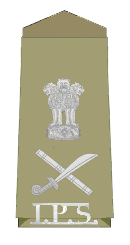
The Mumbai Police is the police department of the city of Mumbai, Maharashtra. It is a part of Maharashtra Police and has the primary responsibilities of law enforcement and investigation within the limits of Mumbai. The force's motto is "Sadrakṣaṇāya Khalanigrahaṇāya".

The Indian Police Service (IPS), is a civil service under the All India Services. It replaced the Indian Imperial Police in 1948, a year after India became independent from the British Raj.

The Indian Forest Service is one of the three All India Services of the Government of India and is one of the central natural resource services. The other two civil service being the Indian Administrative Service and the Indian Police Service. It was constituted in the year 1966 under the All India Services Act, 1951, by the Government of India.
The administrative divisions of India are subnational administrative units of India; they are composed of a nested hierarchy of country subdivisions.
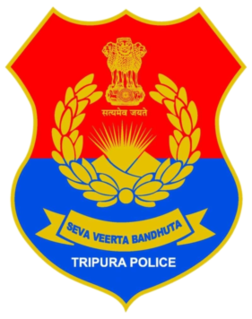
Tripura Police is the law enforcement agency of the state of Tripura which organizes and is responsible for policing activities in the state of Tripura, Northeast India. It was formed in the year 1965. Currently V.S. Yadav, IPS is DGP of Tripura.
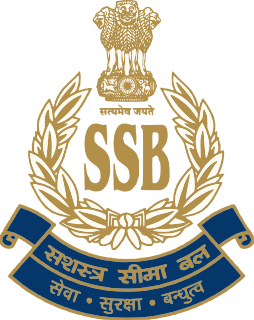
Sashastra Seema Bal (SSB) is a border guarding force of India deployed along its border with Nepal and Bhutan. It is one of the five Central Armed Police Forces under the administrative control of the Ministry of Home Affairs (MHA).

The Bihar Police Department is the law enforcement agency for the state of Bihar, India, with its headquarters in Patna. It has a sanctioned strength of 111,000 personnel, and as of 2017, employs 77,000 personnel. The annual Budgeted Estimate (BE) for Bihar Police for the year 2020-21 is ₹10,021 crore (US$1.3 billion), of which ₹145 crore (US$19 million) has been allocated to Police Modernization.
Additional Director General of Police (ADGP) is an Indian Police Service rank. Though having the maximum possible 3-star police rank just like Director General of Police, ADGP's are considered same to DGP's. The equivalent position or designation are Commissioner of Police of some cities like Kolkata, Chennai special or additional secretary. The insignia of an ADG is the national emblem over a crossed sword and baton. ADG-ranked officers wear Gorget patches on their collar, which have a dark blue background with an oak leaf pattern stitched on it, similar to IGs. ADGs are now posted as the zonal heads in various Indian states. The rank below it is Inspector General of Police and the rank above it is Special Director General of Police
The Indian Ordnance Factories Service (IOFS) is a civil service of the Government of India. IOFS officers are Gazetted defence-civilian officers under the Ministry of Defence. They are responsible for the administration of the Indian Ordnance Factories, which provide the indigenous defence production capabilities of India.
Legislative Assembly elections in India were conducted for nine legislative assemblies in 2013. Voting in Chhattisgarh was held in two phases on 11 November and 19 November 2013. The Election Commission of India (ECI) successfully conducted elections in Tripura, Meghalaya and Nagaland in February and in Karnataka on 5 May. The elections in Chhattisgarh, Delhi, Madhya Pradesh and Rajasthan were conducted in December while the counting that took place on 8 December showed a clear majority for BJP in the states of Madhya Pradesh, Rajasthan and Chhattisgarh, while Congress retained the state of Mizoram and Delhi got a hung assembly, with no single party getting a clear majority.

Krishan Kant Paul is a former Indian Police Service officer, who served as the Commissioner of Police, Delhi from February 2004 to July 2007. Following his retirement from the IPS, he served as the Governor of several states—Meghalaya (2013–15), Manipur (2014-15) and Uttarakhand (2015–18). He had also held the governorships of Mizoram and Nagaland briefly, as additional charges.
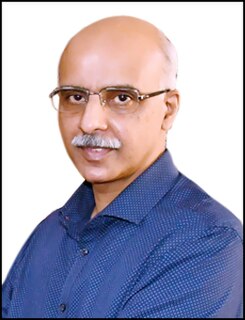
Director General (DG) is the head of the Indian National Security Guard (NSG), the federal contingency deployment force that was created to deal with terrorism in India. The DG is selected by the Home Minister (MHA). In the first thirty-one years since its creation in 1984, the NSG has had twenty-eight DGs, with an average tenure of one year and few months. All the selected DGs have been officers from the Indian Police Service (IPS).
In India, the Head of Forest Forces (HoFF) is the highest ranking Indian Forest Service (IFS) officer in Indian States and Union Territories. All Head of Forest Forces are IFS officers. The HoFF is usually the head of the forest department in every Indian state and is selected by the Governor, based on the recommendation of the council of ministers led by the Chief Minister, from among the senior most Principal Chief Conservators of Forests in the state. The post of HoFF is equivalent in rank, in states, to that of the State Police Chief for the Indian Police Service, chief secretary and lieutenant general of army.

Alok Kumar Verma is a former Director of the Central Bureau of Investigation in India, who also served as Commissioner of Delhi Police and Director General of Tihar Jail. A 1979 batch IPS officer of the Arunachal Pradesh-Goa-Mizoram and Union Territories cadre, Verma has over 39 years of experience in the Indian Police Service (IPS).
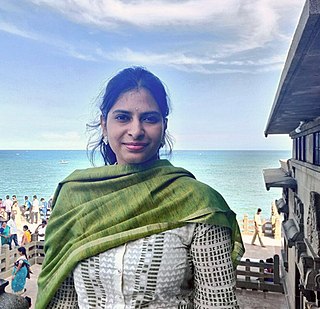
Sharanya Ari is an IAS officer. She secured the seventh rank in All India Civil service examination conducted by UPSC in 2015 and first in Tamil Nadu. Because of her outstanding performance home cadre was allotted to her. She is an officer of the batch of 2016 from the Tamil Nadu cadre of Indian Administrative Service.

Bhaskar Jyoti Mahanta is a 1988 batch (41RR) IPS officer of Assam-Meghalaya cadre. He is the current Director General of Assam Police, and had previously served as the special Director General of Border.

Commissioners of Police in India are IPS officers who head the police force in a commissionerate. A commissionerate can combine several adjoining districts under it. They hold higher executive powers than those available to a Superintendent of Police (SP) or Senior SP (SSP) as in-charge of the police force of a district. Commissioner of Police (CP) is a post that can be held by an IPS officer of the rank SP and above, depending upon the sanction provided by the respective state government.
Jayanto Narayan Choudhury, also known as Jayanta Narayan Choudhury or J N Choudhury is a 1978 batch (31RR) IPS officer of Assam-Meghalaya cadre.
